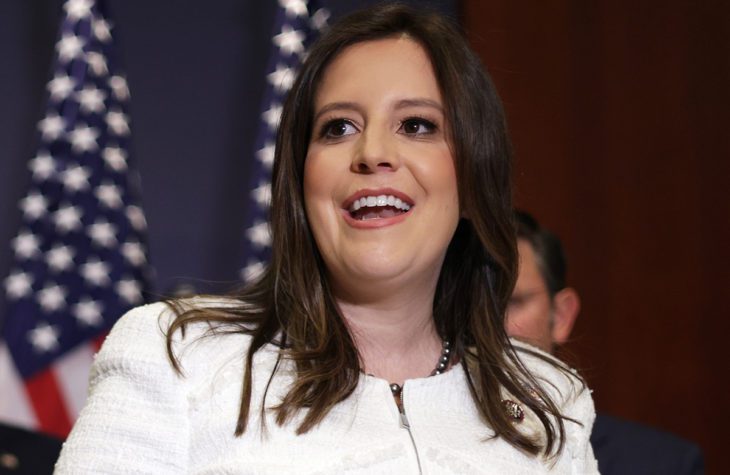Elise Stefanik is a Truce Choice in the Republican Civil War

“We’ve spent 7.5 years with an authoritarian president who ignored our Constitution. We don’t need four more years of that,” Mike Pompeo, the then-Congressman from Kansas, said in the closing days of a fratricidal Republican primary for president.
Not a candidate himself, but a surrogate for Sen. Marco Rubio of Florida, who had then cornered the market on what appeared the intellectual wave of the future (back then: a neoconservative comeback), Pompeo laid in. He told the hometown press, the Topeka-based Capital Journal: Donald Trump “is not a conservative true believer.”
These comments were originally unearthed by Susan Glasser in the New Yorker in 2019 in perhaps the seminal profile of the man who would become Trump’s top diplomat, at the very least, and if not his someday successor. If there was something in the water in 2016, it was certainly lost on Congressman Pompeo. But by 2019, Pompeo was expounding on what nationalism meant to him at the perhaps hallmark think tank of Trump’s term, the Claremont Institute.
So it was not lost on Pompeo when the tide came in. After Trump’s November 2016 victory, Pompeo was in the lobby of Trump Tower almost as fast as Shinzo Abe of Japan, and on the phone with him as swiftly as Abdel Fattah al-Sisi of Egypt, two hard-nosed pragmatists who secured chummy relationships for their countries with Trump’s rowdy White House. Sisi had even met with Trump at the U.N. in September of that year, as most world leaders, including American ones, prepared for President Hillary Clinton.
But if realpolitik is understood on the international stage, as it relates to Donald Trump and his outsized political career, it is just as often misinterpreted on the domestic front.
This is it. This Republican defection will surely mean curtains for Trump’s clout in the party and the country writ large, goes the standard operating motif of the last half-decade, any time Trump suffers a defection. This is the true Trumpist—or, this is not a true Trumpist goes the mirror theme—any time Trump or his entourage brings in fresh blood.
The day may yet come—sooner rather than later judging by Republican appetite for the reigning “woke” corporate mentality, the theology du jour—when Republicans are stuffed to the gills with neo-Buchananite staffers and politicians. At the very least, there are certainly those working on that.
But that day is not today. And demands for such ideological rigidity abjure the kind of success seen by a different breed of Republican during the Trump years: the conservative pragmatist. Ideological nationalists in high places are, so far, rare—perhaps just one reason why Tucker Carlson, Steve Bannon, Josh Hawley, and others have gained such prominence in recent years: a lack of competition for a product in high demand.
More common, if not just as successful, have been purer politicians: Pompeo, former Attorney General William P. Barr and former National Security Advisor Robert C. O’Brien, among others. From a Republican point of view, those who have gambled and fully renounced Trump—Utah Sen. Mitt Romney, former Secretary of Defense James Mattis, former National Security Advisor John Bolton, all floats in a NeverTrump parade—have seen their clout consistently consigned to the periphery, after considerable hype that the precise opposite would occur.
This dynamic has seemingly been replayed in recent days with the rise of Rep. Elise Stefanik of New York, and the dramatic apostasy of Rep. Liz Cheney. As exposed by intrepid muckrakers, Stefanik once harbored similar doubts about Trump, Trumpism, and the like that are now emphasized by the woman she succeeds as House Republican Conference chair.
And as pointed out by her conservative critics, most prominently Ann Coulter, Stefanik’s voting record is actually less in sync with the 45th president’s priorities than was Cheney’s. So why did Donald Trump so enthusiastically endorse the New York millennial?
The personnel carousel of his administration should stand testament that Donald Trump only cares so much that people agree with Donald Trump. Rapport, even style, and absolutely avoiding constant, flagrant insults of the man himself are the orders of the day. As noted by veteran Empire State chronicler Elizabeth Benjamin in the Times: “The reality is that Ms. Stefanik has always been a shape-shifter, driven more by the political zeitgeist than any strongly rooted ideology.”
And it is in the uncertain environment of 2021 that Stefanik has succeeded. Eighteen years Cheney’s junior, the Republican leadership feels they just got a savvier upgrade in the political c-suite. They’re right. And if history is any guide, concerned congregants of the true faith need only worry so much.
Perhaps case in point: Joe Biden is the president. But no one, perhaps most especially Joe Biden, thinks this is the Joe Biden of 1996, as doubtless Wall Street and many swing voters had hoped. Political gravity has its own logic, especially in intra-party politics in the digital age. Casting aside an apparent one-term pledge (we’ll see), the Elise Stefanik of 2021 is simply unlikely to resemble the Elise Stefanik of 2016, to the chagrin and surprise of allies and antagonists alike.
Comments